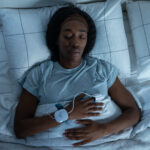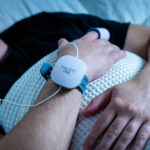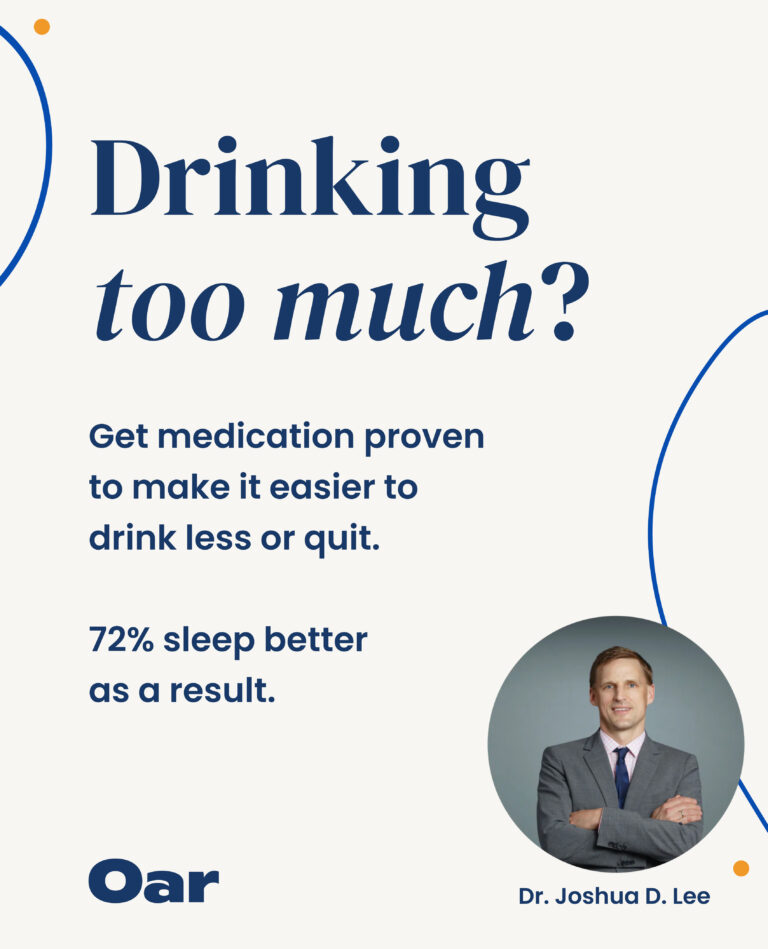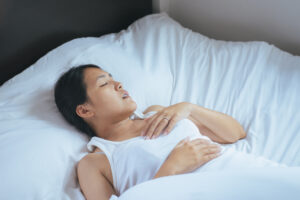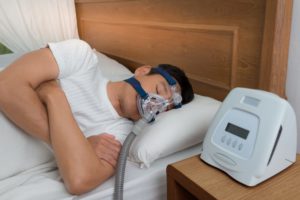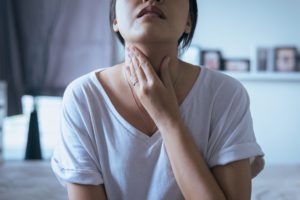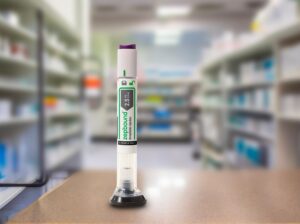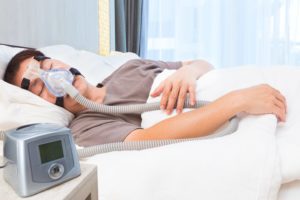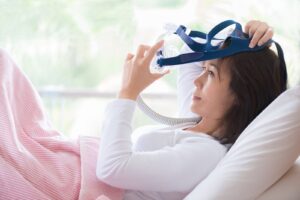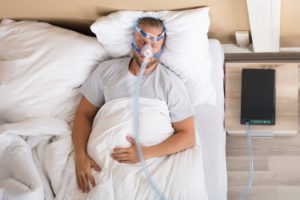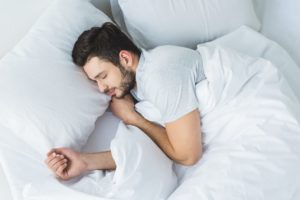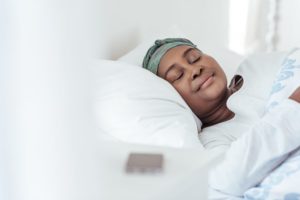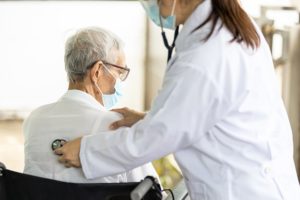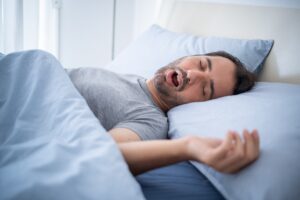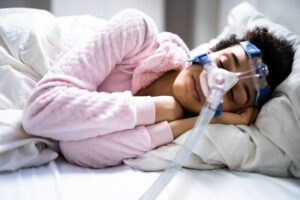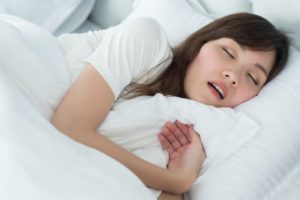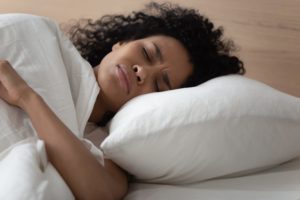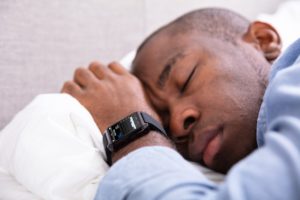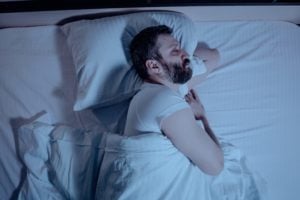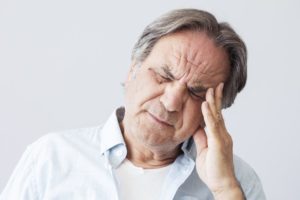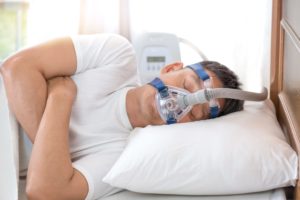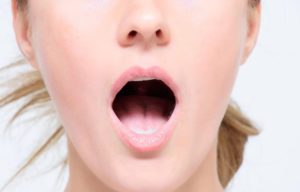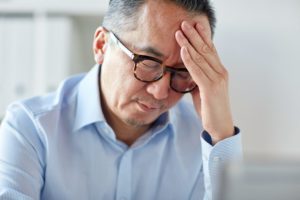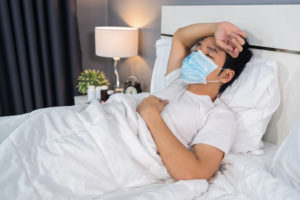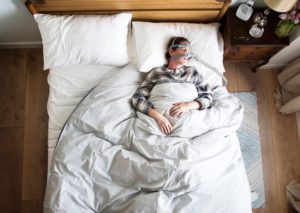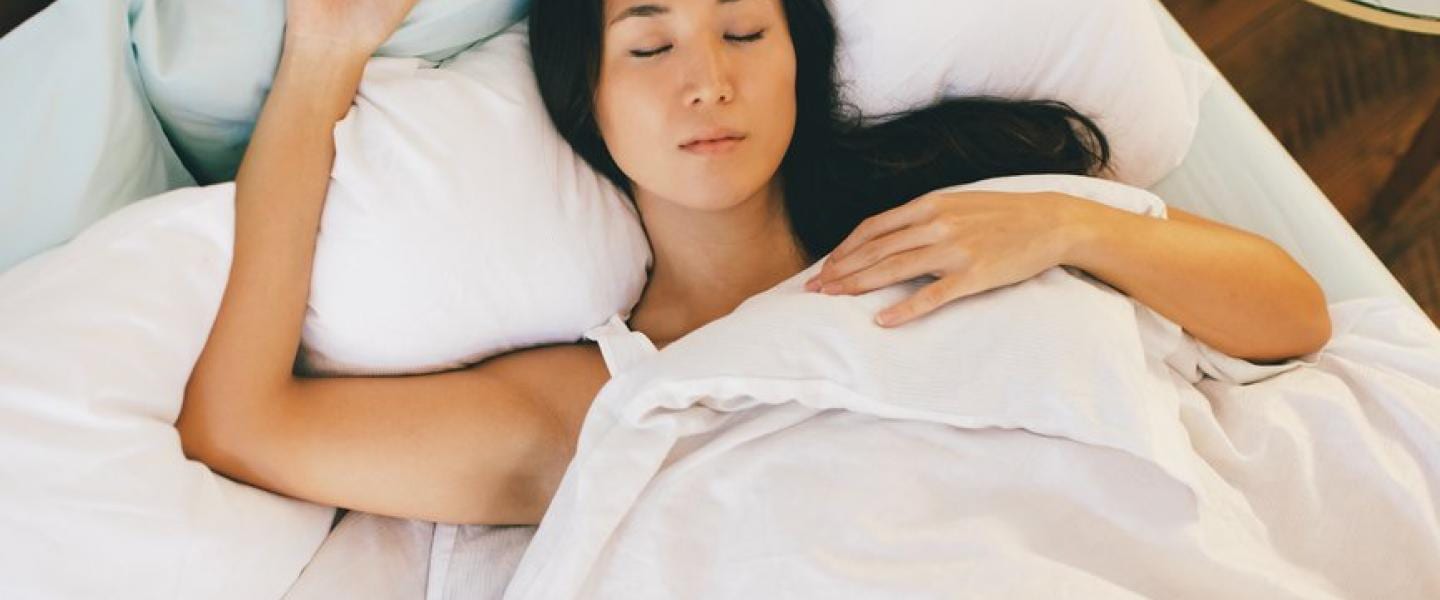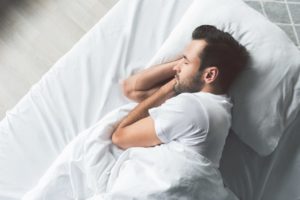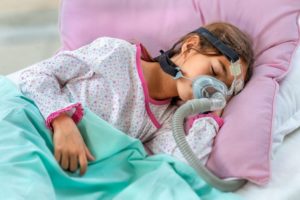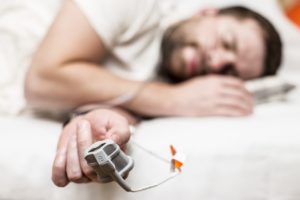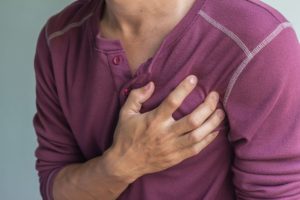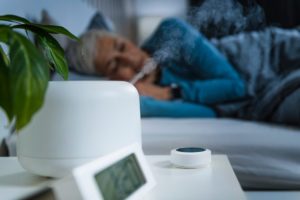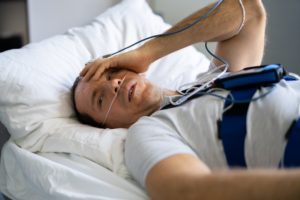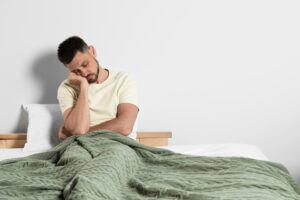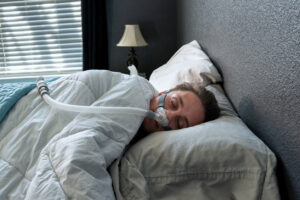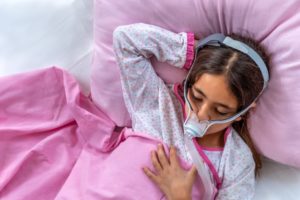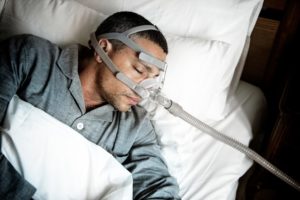When you buy through our links, we may earn a commission. Products or services may be offered by an affiliated entity. Learn more.
Alcohol and Sleep Apnea
- Alcohol is a relaxant that can worsen airway obstruction in sleep apnea.
- Alcohol inhibits the nervous system and brain’s response to breathing issues during sleep.
- Individuals with sleep apnea should limit alcohol intake and consult with their doctor about breathing problems.
Drinking alcohol is common, with roughly 55% of American adults reporting having a drink in the last month. Although alcohol use near bedtime can promote drowsiness, it often results in fragmented, lower-quality sleep.
Drinking alcohol may also contribute to sleep apnea, a condition marked by repeated breathing disruptions during sleep. Alcohol can affect people with both types of sleep apnea, known as obstructive sleep apnea (OSA) and central sleep apnea (CSA).
OSA is much more common than CSA and involves the airway being blocked by tissues in the mouth and throat. In CSA, breathing problems occur because of disrupted signaling between the brain and respiratory muscles.
Alcohol slows down the central nervous system , which can worsen breathing in people with OSA and CSA. Untreated sleep apnea is linked to a number of potentially serious health complications, and alcohol consumption may heighten these health risks.
Especially for people who have sleep apnea, understanding alcohol’s effects on sleep can be an important part of optimizing lifestyle choices to promote healthier and more restful sleep.
Think You May Have Sleep Apnea? Try an At-Home Test
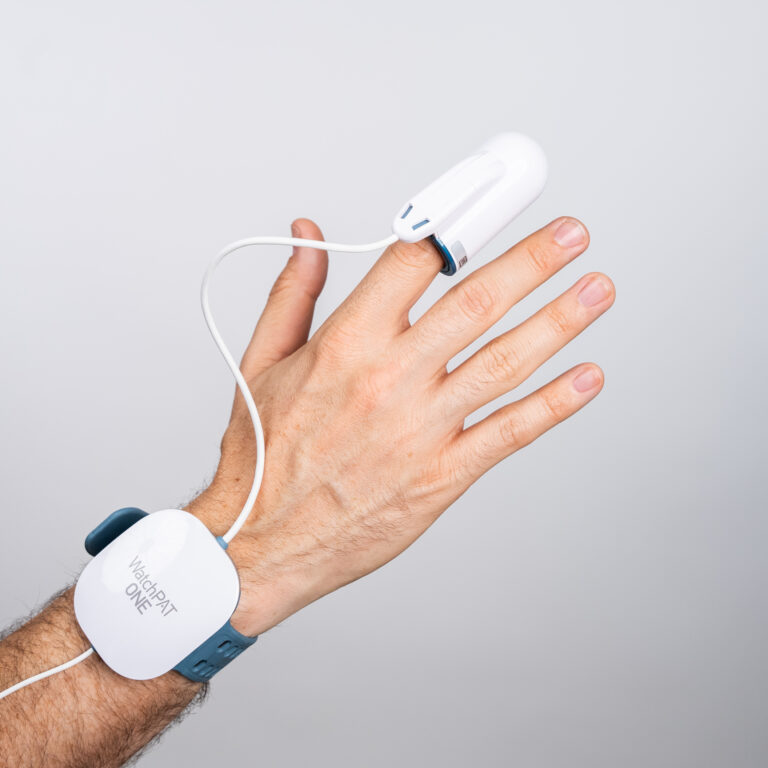
our partner at sleepdoctor.com
10% off Home Sleep Tests
Buy Now“Truly grateful for this home sleep test. Fair pricing and improved my sleep!”
Dawn G. – Verified Tester
The Relationship Between Alcohol and Obstructive Sleep Apnea
Obstructive sleep apnea (OSA) affects 10% to 30% of adults in the United States. Research to date has found that alcohol may contribute to the development of OSA and can also worsen symptoms and outcomes in people who already have the condition.
Can Alcohol Consumption Cause Obstructive Sleep Apnea?
Alcohol consumption has been associated with a higher risk of having OSA, but more research is needed to determine if alcohol can actually cause OSA. Because many risk factors are associated with OSA, it can be difficult to identify a single cause for why OSA occurs in a specific person.
Observational studies in multiple countries have analyzed whether people who drink alcohol are more likely to have OSA. A meta-analysis of these studies found that OSA was around 25% more common in heavier drinkers compared to non-drinkers or lighter drinkers. While this demonstrates a correlation, it does not necessarily prove that alcohol itself causes OSA.
Can Drinking Alcohol Worsen Obstructive Sleep Apnea?
After drinking alcohol, a person with OSA is prone to having more and longer-lasting breathing disruptions. Multiple studies have found that alcohol use increases a person’s apnea-hypopnea index (AHI), which measures how many times per hour a sleeper’s breathing pauses or becomes restricted. Drinking alcohol has also been tied to reduced blood oxygen levels in people with OSA.
There are several reasons why alcohol use may make OSA worse.
- Higher arousal threshold: OSA-related breathing restriction and low oxygen levels cause people to partially awaken, allowing breathing to be restored. Alcohol raises the arousal threshold, meaning it becomes more difficult for a person to wake up. Therefore, breathing obstructions must be longer or more severe to cause an awakening.
- Relaxation of muscles around the airway: Drinking alcohol can make the muscles of the mouth and throat relax. This loss of muscle tone makes it more likely that these loose tissues will block the upper airway.
- Increased nasal congestion: Alcohol consumption can induce changes in the nose’s blood vessels, which can contribute to congestion and make it harder to breathe through the nose. Nasal congestion can put more pressure on the upper airway and intensify breathing disruptions in people with OSA.
- Timing of alcohol consumption: Drinking alcohol in the evening or shortly before bed raises blood alcohol levels during sleep, increasing the effect on OSA. The impact on breathing may be higher during the first half of the night while the body is still metabolizing alcohol.
- Amount of alcohol consumed: Larger amounts of alcohol can heighten its effect on OSA. Many studies have found that two to three standard drinks are associated with negative effects.
- Age:Older people can be more susceptible to alcohol’s effects, so those with OSA may make the condition worse if they drink before bed.
In addition to making symptoms worse, alcohol consumption may also compound health risks linked to OSA. For example, people with OSA have a greater risk of drowsy driving . Drinking alcohol can cause further impairment and make motor vehicle accidents more likely.
By contributing to lower oxygen levels, alcohol use may also increase cardiovascular problems associated with untreated OSA.
Does Using a CPAP Affect the Impact of Alcohol on Obstructive Sleep Apnea?
While research so far is limited, studies suggest that using continuous positive airway pressure (CPAP) can reduce or eliminate the effects of alcohol consumption on OSA.
CPAP is a type of treatment for OSA that works by pumping air through a mask and into the airway. The pressurized stream of air helps hold the airway open while a person sleeps.
To date, only a few small studies have examined whether drinking alcohol makes OSA worse for people who use a CPAP machine. However, these studies found that CPAP machines could prevent breathing disruptions in people with OSA who consumed alcohol, and that this did not require changing the pressure settings on the CPAP devices.
More research will be needed to confirm these results. Meanwhile, people with OSA who use CPAP should remain aware of other possible effects of alcohol on sleep.
Alcohol and Other Sleep-Related Breathing Problems
The relationship between alcohol and sleep apnea is most clearly established in people with obstructive sleep apnea. But alcohol use is also linked to other types of sleep-related breathing disorders and snoring.
How Does Alcohol Affect Central Sleep Apnea?
In central sleep apnea, the brain and respiratory muscles fail to properly regulate breathing. Alcohol reduces activity in the brain and central nervous system, which can make CSA worse by slowing a person’s breathing.
How Does Alcohol Affect Other Sleep-Related Breathing Disorders?
Some sleep-related breathing problems are linked to hypoventilation, a condition in which a person fails to get enough oxygen because their breathing is weak or slow. Drugs that depress the central nervous system, including alcohol, can worsen hypoventilation .
For example, doctors often recommend that people with a breathing disorder called obesity hypoventilation syndrome (OHS) avoid drinking alcohol because of its effects on respiration during sleep.
The effects of alcohol on hypoventilation may be even greater in people who already use medications with sedative effects.
How Does Alcohol Affect Snoring?
Drinking alcohol close to bedtime increases the likelihood that a person will snore. Alcohol causes the muscles in the mouth and throat to relax, which makes these tissues susceptible to fluttering and making noise as a person breathes in and out.
While snoring is common in people with OSA, most people who snore do not have sleep apnea. In fact, most snoring does not interfere with breathing and is believed to be harmless. However, in people who typically snore, drinking alcohol may make snoring more severe.
The Impact of Alcohol on Sleep
In addition to its potential impacts on breathing and sleep apnea, alcohol can interfere with sleep because of its effects on brain activity.
Although alcohol can make a person feel sleepy at bedtime, it throws off the normal process of sleep. As alcohol wears off during the night, a person is more likely to have shallower, lower-quality sleep and to awaken more frequently.
Drinking alcohol can interrupt a person’s sleep-wake cycle and may contribute to insomnia in people who rely on alcohol’s sedative effects to initially fall asleep.
These sleep-disrupting consequences of alcohol consumption are most often found in people who have three or more drinks before sleeping. But even light drinking close to bedtime has the potential to interfere with sleep.
Tips for People Living With Sleep Apnea
Experts often suggest that people with sleep apnea avoid drinking alcohol. If abstaining from drinking completely is not realistic, it may be beneficial to reduce alcohol consumption and try to stop drinking at least a few hours before bedtime.
Regardless of whether they choose to drink alcohol, people with obstructive sleep apnea can benefit from certain tips for living with the condition.
- Stick with the treatment plan:Treatment for OSA often involves CPAP or a similar device. To be effective, the CPAP must be used consistently, which may also lessen the effects of alcohol consumption on OSA. Concerns about comfort or other issues when using a CPAP should be directed to a doctor or sleep specialist.
- Consider lifestyle changes: For many people, losing weight, getting regular exercise, and avoiding back sleeping can reduce the severity of OSA.
- Practice good sleep hygiene: In addition to treating sleep apnea, taking steps to establish healthy sleep habits and design a sleep-friendly bedroom may help prevent unwanted interruptions during the night.
When to See a Doctor
Because it is not possible to determine if someone has sleep apnea based on symptoms alone, people with any of the following issues should see a doctor or sleep specialist:
- Gasping for air or making choking sounds during sleep
- Frequent snoring that is very loud
- Abnormal breathing patterns while asleep
- Significant daytime sleepiness
- Regular morning headaches
- Noticeable lack of focus or concentration during the day
It may help to ask a bed partner or roommate about snoring and other sleep-related breathing problems, since people with sleep apnea are not always aware of these issues.
When a person has one or more of these symptoms, a doctor can review their specific situation and determine whether to recommend sleep apnea testing, which is required to diagnose the condition.
People who have already been diagnosed with sleep apnea should talk with their doctor if their symptoms do not improve after starting treatment. A doctor can discuss alcohol habits and other lifestyle choices, as well as recommend steps to make treatment more effective.
It is also important to seek professional help if a person shows signs of alcohol abuse. For example, if consuming alcohol interferes with work, school, or personal relationships, it may be an indication of unhealthy drinking habits .

Still have questions? Ask our community!
Join our Sleep Care Community — a trusted hub of sleep health professionals, product specialists, and people just like you. Whether you need expert sleep advice for your insomnia or you’re searching for the perfect mattress, we’ve got you covered. Get personalized guidance from the experts who know sleep best.
References
7 Sources
-
National Institute on Alcohol Abuse and Alcoholism. (2022, March). Alcohol facts and statistics., Retrieved October 24, 2022, from
https://www.niaaa.nih.gov/publications/brochures-and-fact-sheets/alcohol-facts-and-statistics -
MedlinePlus: National Library of Medicine (US). (2022, March 22). Alcohol., Retrieved October 24, 2022, from
https://medlineplus.gov/alcohol.html -
Kline, L. R. (2022, June 1). Clinical presentation and diagnosis of obstructive sleep apnea in adults. In N. Collop (Ed.). UpToDate., Retrieved October 24, 2022, from
https://www.uptodate.com/contents/clinical-presentation-and-diagnosis-of-obstructive-sleep-apnea-in-adults -
Simou, E., Britton, J., & Leonardi-Bee, J. (2018). Alcohol and the risk of sleep apnoea: A systematic review and meta-analysis. Sleep Medicine, 42, 38–46.
https://pubmed.ncbi.nlm.nih.gov/29458744/ -
Gurubhagavatula, I. (2022, September 1). Drowsy driving: Risks, evaluation, and management. In T. E. Scammell (Ed.). UpToDate., Retrieved October 24, 2022, from
https://www.uptodate.com/contents/drowsy-driving-risks-evaluation-and-management -
American Academy of Sleep Medicine. (2014). The International Classification of Sleep Disorders – Third Edition (ICSD-3). Darien, IL.
https://aasm.org/ -
National Center for Chronic Disease Prevention and Health Promotion, Division of Population Health. (2022, April 19). Alcohol and public health: Frequently asked questions. Centers for Disease Control and Prevention., Retrieved October 24, 2022, from
https://www.cdc.gov/alcohol/ardi/faqs.html


